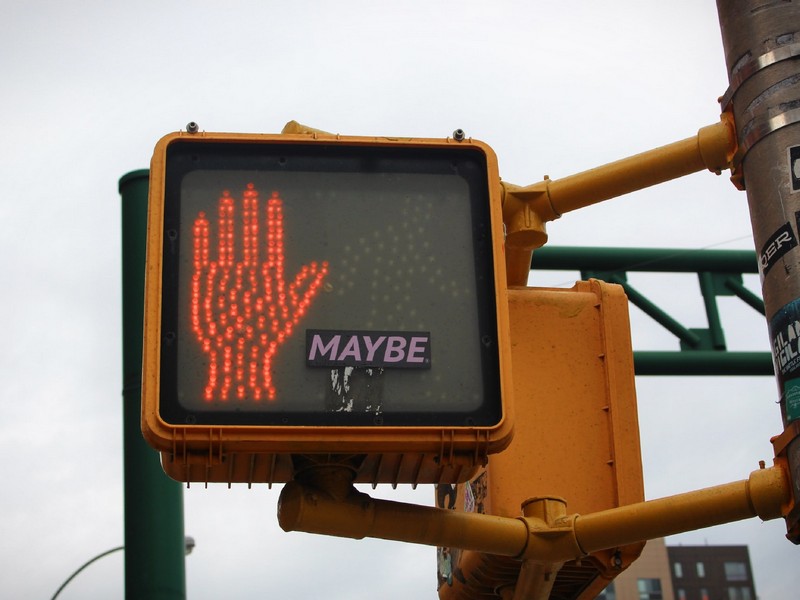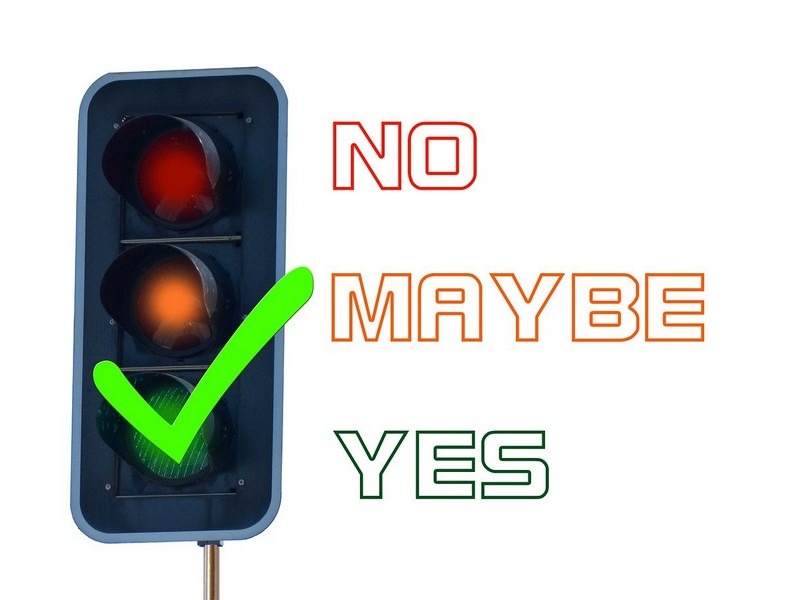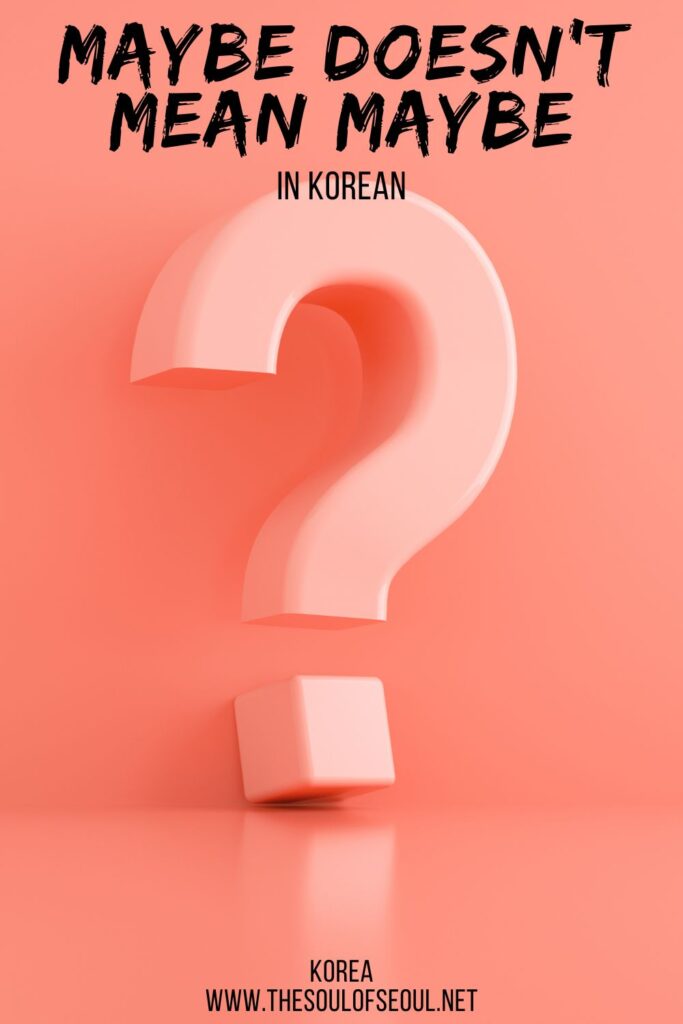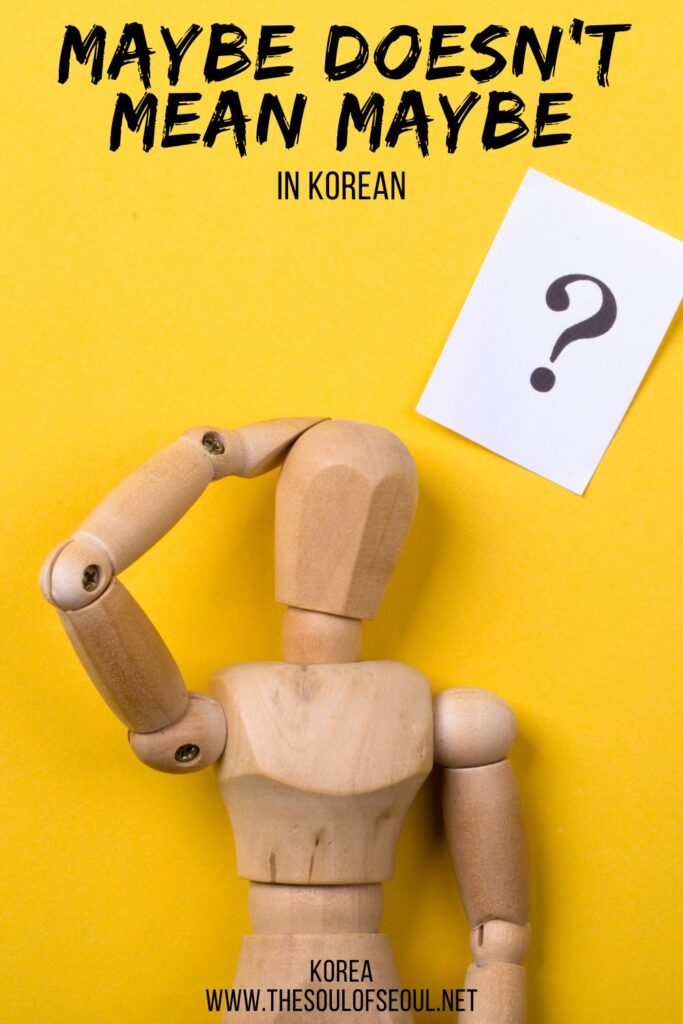Maybe Doesn’t Mean Maybe In Korean
Last Updated on October 23, 2023
My first year in Korea, a new Korean friend asked me if I wanted to do something on the weekend. Not wanting to say “no” outright but knowing that I had a Korean lesson and probably would have plans afterward with my roommate I said “maybe”. I thought the matter was done there and then… but it wasn’t. Did you know that “maybe” doesn’t mean “maybe” in English? If you’re learning Korean like me, then you’ll need to learn this.

(This post contains affiliate links, which means I receive a certain percentage of a sale if you purchase after clicking at no cost to you.)
To me, in English, ‘maybe’ generally implies that you don’t want to or are not inclined to want or do something. It’s a polite way to refuse so that you don’t have to explicitly say ‘no’. I was surprised when the weekend arrived and at 6:00pm I received a phone call from said friend asking where I was because she was waiting for me at the subway station.
Me: Oh! What? Where are you? I said maybe, I didn’t know we made plans for sure.
Her: You said maybe. Didn’t that mean you were going to come?
Me: Um… is that what it meant to you? Well, I’m nearby with some friends, would you like to join us?
Her: Yes!
Was it all a plan to tag along? I doubt it. A simple case of ‘maybe’, or amado (아마도), confusion. At the time, I simply deduced from the situation that she hadn’t quite learned what ‘maybe’ meant and perhaps in the future I needed to be more open and honest with my feelings. Those first two years other situations with managers would sprout up where they asked me if I could do more work and I would say “maybe” hoping that we could come back to the topic later after I looked at my schedule to see if it were possible or not, though I felt strongly there would not be time. I would then find the extra work left on my desk.

After nine years, now looking back on that and many other situations where I used ‘maybe’ which eventually turned into the Korean amado or 아마도, which should have the same meaning because it’s translated so, again and again I was thrust into situations that I did NOT want to be in. Why were people so confused with my polite refusals to do things? When I’m shifting my weight, not answering positively and following it up with a ‘maybe’, how is that hard to understand?
Maybe is one of those words that loses its meaning, or the subtlety of the word, in translation. While most English speakers will use ‘maybe’ to mean ‘possibly but most likely no’, Koreans will generally use ‘maybe’ to mean ‘yes’. Such a simple and completely opposite usage of this oft used word causes many confusions in daily life. Learning a language can be difficult but adding the subtle differences in meaning which aren’t put into a dictionary but just learned over time makes it all the more complex.

I think this leads to a bigger point though: Koreans often say that Americans are extremely brazen with showing their feelings. Perhaps we are, but I would point out that perhaps one reason for overly showcasing feelings is in order to get straight to the point. While Koreans will try to maintain their subtle language structures even with foreigners and even in English, I think Americans tend to move past the subtleties of our language once we see it’s not working and shoot straight for an understanding. At least, that’s what I did.
My Korean friends and managers are often telling me that they appreciate my matter-of-fact and simple replies. Do they really? Or, are they trying to tell me I’m too honest in the subtle way that Koreans do? I’d venture it’s partly both, but for me I find it much more efficient to say “yes” or “no” rather than trying to politely refuse in a subtle way that has been disproved to work for me numerous times.
What do you think? Is it better to hold on to the subtleties in either English or Korean if it’s clear you’re not getting your point across? Or, is it better to talk in more black and white terms if it makes the conversation move along faster and more efficiently?
Learn Korean and See What You Think
- Check out the best Korean classes online to find a course that is good for you.
- Look into the best books to learn Korean from textbooks to slang and verb conjugation.
Are you looking to learn Korean in an easy and efficient way? Check out 90 Day Korean for free articles as well as online courses and lessons with instructors that will work directly with you! Learning to read Korean is simple… if you just get started. Learn to read and then take it from there. What are you waiting for?
Check out some of these other posts on learning Korean in Korea, humorous phrases that crack me up every time I say them, which is often because I like saying them and laughing out loud.
- Learning Korean With Noisy Salesmen: Is that guy trying to buy my boogers? You’ll see.
- Conversations With Koreans: Wait, we aren’t friends?
- Conversations With Koreans: Have You Eaten?
- Conversations With Koreans: Where are you from?
- Learning Korean Can Be Laugh Out Loud, Pt. 1
- Learning Korean Can Be Laugh Out Loud, Pt. 2
Did you like this post? Pin It!





7 Comments
Stephanie
This is interesting to me because I’ve had almost the polar opposite experience. I’ve had korean friends say “maybe” when I know full well they want to say no. Whereas my use of maybe is a mote genuine maybe as in I’m interested but don’t 100% want to commit yet.
Sarah
I talk about this a lot with my foreign friends. My Korean coworkers tend to use “maybe” for things that have a definite yes or no. Generally, this means that they will tell me “maybe I will teach this lesson” or “maybe students will have other activities that day” to which I have to prod more to get the definite answer to plan for. At this point, I just assume that the Korean “maybe” means “yes, this is definitely happening.”
Sophie
For me (and I’m Australian) maybe is not yes or no. It’s neither. It’s used if you’re not sure of something, usually a way to revisit the question/answer or think about it so you have your real answer.
So I definitely don’t think it should be taken to mean ”yes.” But nor should it be taken to be mean ”no.” It’s a “Not right now,” or “I’m not sure.”
At least that’s how it is over here but people will always misunderstand it. When I was kid and I said maybe another kid thought I meant yes when I actually meant “I’m not sure of the answer yet.”
Rachel
Totally agree. As a Kiwi/Australian it has always meant “I’m not sure”, not a yes or no at all.
Helena
I’ve had this come up. A friend was trying to clarify whether I thought she had said something, and I said “아마.” So she asked, “아마 했어요, 아마 안했어요?” and I said, “Maybe you did, maybe you didn’t. I don’t know!” So we had a discussion about what “maybe” means. After that we occasionally used probability percentages.
cat
I think most Koreans mistranslated the word ‘maybe’. For Americans, Maybe is a word to refuse in a polite way which means it’s less than 10% chance of doing it. however, Koreans normally refuse in a different way. like ‘when we are free both’, ‘later’ or ‘someday’ in korean.. I guess that’s why they didn’t catch up. just like you don’t get exactly what koreans say, so do they. that’s really subtle. anyways so interesting
Hallie
Yeah, there are a lot of subtle things within our languages that it’s difficult to pick up on. It’s even difficult to explain sometimes.